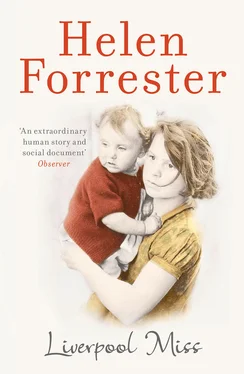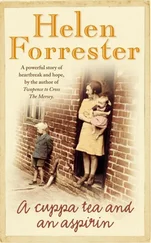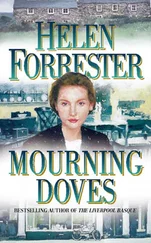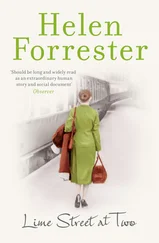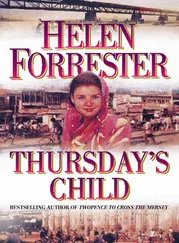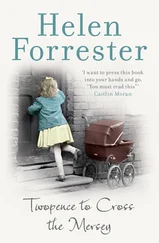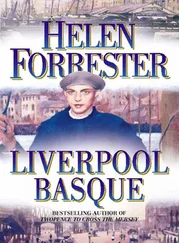HELEN FORRESTER
Liverpool Miss
Published by HarperCollins Publishers Ltd
The News Building
1 London Bridge Street
London SE1 9GF
www.harpercollins.co.uk
First published in Great Britain by HarperCollins Publishers 2012
This edition published by Harper 2016
Copyright © the estate of Jamunadevi Bhatia 1985
Cover layout design © HarperCollins Publishers Ltd 2016
Cover photograph © Picture Post/Hulton Getty
HarperCollins has made every effort to find copyright holders and obtain permission for the use of copyright material in this book. If any material has been used without the owner’s permission please contact HarperCollins and we will give appropriate in future reprints or editions of this book.
Helen Forrester asserts the moral right to be identified as the author of this work.
A catalogue copy of this book is available from the British Library.
This novel is entirely a work of fiction. The names, characters and incidents portrayed in it are the work of the author’s imagination. Any resemblance to actual persons, living or dead, events or localities is entirely coincidental.
All rights reserved under International and Pan-American Copyright Conventions. By payment of the required fees, you have been granted the non-exclusive, non-transferable right to access and read the text of this e-book on screen. No part of this text may be reproduced, transmitted, down-loaded, decompiled, reverse engineered, or stored in or introduced into any information storage and retrieval system, in any form or by any means, whether electronic or mechanical, now known or hereinafter invented, without the express written permission of HarperCollins.
Source ISBN: 9780008180959
Ebook Edition © Dec 2016 ISBN: 9780007369317
Version 2016-11-08
To my family and friends who helped me to remember
Table of Contents
Cover
Title Page
Copyright
Dedication
Chapter One
Chapter Two
Chapter Three
Chapter Four
Chapter Five
Chapter Six
Chapter Seven
Chapter Eight
Chapter Nine
Chapter Ten
Chapter Eleven
Chapter Twelve
Chapter Thirteen
Chapter Fourteen
Chapter Fifteen
Chapter Sixteen
Chapter Seventeen
Chapter Eighteen
Chapter Nineteen
Chapter Twenty
Chapter Twenty-One
Chapter Twenty-Two
Chapter Twenty-Three
Chapter Twenty-Four
Chapter Twenty-Five
Chapter Twenty-Six
Chapter Twenty-Seven
Chapter Twenty-Eight
Chapter Twenty-Nine
Chapter Thirty
Chapter Thirty-One
Chapter Thirty-Two
Chapter Thirty-Three
Chapter Thirty-Four
Chapter Thirty-Five
Chapter Thirty-Six
Chapter Thirty-Seven
Chapter Thirty-Eight
Epilogue
Keep Reading …
Read the First Chapter of By the Waters of Liverpool
About the Author
By Helen Forrester
About the Publisher
It had begun to rain and I was shivering, as I manoeuvered the squeaking Chariot over the road to the corner of Castle Street. Avril was red in the face with rage. She stormed at me because I would not take her out of the pram and let her walk amid the busy lunchtime crowd. At the other end of the pram, beneath the leaking hood, Baby Edward grizzled miserably for the same reason.
Since the October day was too cold for us to walk in the park, I had brought them into the city, thinking that it would be more sheltered and that we could amuse ourselves looking in the shop windows. And now we had wandered into the business district.
Pretty secretaries, rushing back from lunch, and smart businessmen, carrying umbrellas and briefcases, glanced impatiently at the intruding pram with two grubby urchins in noisy protest. It belonged away in the slums, like the tatterdemalion who pushed it.
I did not care. I was resigned to people staring at my long, wind-chapped, bare legs, at my toes sticking through a pair of old plimsolls, at an outgrown gym slip worn without a blouse, a ragged cardigan covering part of my nakedness.
Through the increasing rain, I pushed the pram dreamily amongst them. In my mind I was not walking in black, depressing Liverpool; I was in the countryside and then in the fine, old southern town from which I had been unceremoniously plucked two years before. It was market day, and Father and I were looking at the horses brought in for sale. As we moved about, the ploughmen, the shepherds and the farmers would touch their forelocks to the distinguished-looking gentleman, strolling around with a little daughter in the uniform of a good private school.
‘ Echo! Liverpool Echo . Read all about it!’ shouted a man in a cloth cap, thrusting a paper towards the hurrying throng. I blinked, and hurriedly swerved to avoid him.
Would we always have to stay in Liverpool, I wondered depressedly. Would we always be cold and hungry?
‘Oh, shut up, Avril,’ I scolded crossly, and stopped the pram while I tucked an old overcoat round Baby Edward’s knees and then pushed the edges of it up over her lap. ‘Look, love. See up there – on the top of the town hall. There’s Minerva. She’s looking at you.’
Avril turned her woebegone face upwards towards the dome I had pointed out.
‘See,’ I said. ‘She’s smiling at you. Hasn’t she got a lovely golden face? But I think she’s got smuts on her nose, just like you.’ I touched Avril’s damp, little nose with a playful finger, and she sniffed and stopped crying.
Baby Edward could not see what I had pointed out; but, when I touched his nose and laughed at him, he saw hope of a game and tried to reach forward to touch my hooked nose. Tiny fingers grasped at my horn-rimmed glasses. I backed away hastily before they fell off.
Laughing at each other, we continued along the street.
Many people thought it was Britannia who sat looking down at Liverpool, but Father had told me it was Minerva, the Goddess of Wisdom, Invention and Handicrafts. He assured me that she also took care of dramatic poets and actors.
There were plenty of craftsmen in Liverpool of whom she might have been proud, even some actors and a poet or two, but most of them queued at the Labour Exchanges, their abilities unused. They stood idly round the dock gates, where ships lay in every stage of decay. They hung around outside the gaily lit public houses. Her sailors, skilled men, sat hungry in their cold kitchens, while their despairing wives nagged and their children went barefoot.
Amongst the defeated men in the queues at the Labour Exchange, Father had stood for over two years. Ruined by the Depression and, in part, by his own extravagances, he had brought us back to his native city in the hope of finding work. But, in the Liverpool wet, he had seemed like a lost butterfly, with wings beaten useless by the rain. He had watched, helpless, as Mother struggled, without medical aid, to recuperate from a major operation and a mental breakdown. Though the wartime marriage had not been a happy one, her degeneration into a haggard virago must have broken his heart.
To look at his seven children was almost too much for him. We were a hungry, ragged and increasingly unruly crew, disoriented by our parents’ disasters, seven small sparrows with our beaks open, loudly demanding to be fed.
Because Mother was at first so ill, I suddenly had thrust upon me, as the eldest child, the task of caring for her and for my brothers and sisters. The Public Assistance Committee gave Father forty-three shillings a week, out of which we paid twenty-seven shillings a week for three unheated attic rooms. The remaining sixteen shillings had to cover every need of nine people; and for a time it seemed certain that Baby Edward would die for lack of milk, and I often looked with terror at our empty food shelf.
Читать дальше
